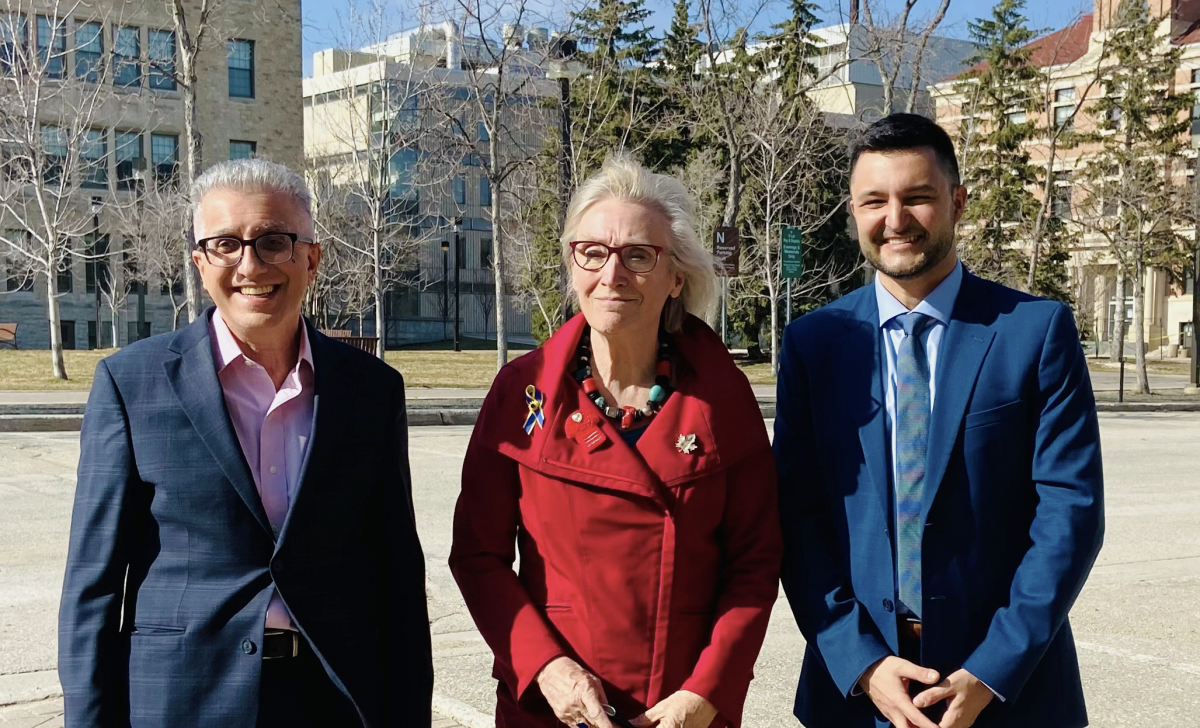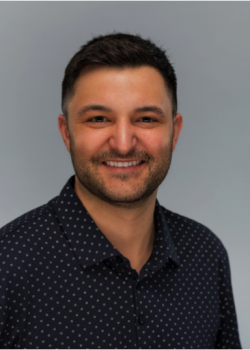
L-R: UM President Dr. Michael Benarroch, The Honourable Carolyn Bennett, and Dr. Rusty Souleymanov
Improving access to health care and social services for marginalized people in Canada
Dr. Rusty Souleymanov, assistant professor, has been nationally recognized for his current efforts to make health care, community-based services, and social programs accessible to some of Canada’s most disenfranchised and marginalized communities.

Dr. Rusty Souleymanov
Over the past two years, Dr. Souleymanov was awarded more than $1.2 million through multiple grants from the Federal Government of Canada, the Canadian Institute of Health Research (CIHR) and the Public Health Agency of Canada (PHAC) to lead his program of study. His research seeks to inform culturally sensitive models of health care and community-based services.
Dr. Souleymanov aims to not only prevent health and social disparities but also to promote well-being among key populations.
“As a minority in Canada, research with marginalized communities is very personal to me,” says Dr. Souleymanov. “Drawing on my own lived experience, and the 12 years I spent as a community-based HIV and harm reduction researcher in Ontario and Manitoba, my program of research focuses on the health and wellbeing of socially and economically marginalized communities with a particular focus on the social sciences of harm reduction and infectious disease.”
“Through my program of research, I am privileged to work with a variety of key and priority populations, including First Nations, Inuit, and Métis people, Black, African, and Caribbean people, 2SLGBTQIA+ communities, immigrants and refugees, people who use injection drugs, and people who live with HIV and Hepatitis C.”
One of his main focuses of research study is the crucial social science of harm reduction and infectious diseases that affect marginalized communities.
“In Canada, we know these communities are already disproportionately affected by a variety of health inequities, including negative sexual and physical health outcomes, mental health outcomes, and substance use,” Dr. Souleymanov says. “For example, infectious diseases such as HIV, Hepatitis C, and COVID-19 disproportionately affect these communities in Canada.”
“To turn the tide on these health disparities, my program of study through the Village Lab (www.villagelab.ca) became focused on how to make sure that health care and community-based services are available and accessible to the most marginalized people in Manitoba.”
In 2021, Dr. Souleymanov developed a research lab at UM called Village Lab, which is an interdisciplinary, community-based research lab at the Faculty of Social Work. The Village Lab aims to conduct rigorous and applied social science and community-based health research that can be used to prevent a variety of health and social disparities and promote wellbeing among vulnerable and marginalized populations in Canada. Research projects involve community guiding circles that are representative of diverse communities and key/priority populations we work with. Along with Dr. Souleymanov, the Village Lab team includes an Indigenous Elder, a Knowledge Keeper, people with lived experience, graduate and undergraduate students and research assistants, and research and community program coordinators.
On May 6th, The Honourable Carolyn Bennett, MP, minister of mental health and addictions, visited Dr. Souleymanov to discuss the important work done through the Village Lab, including the CIHR-funded work that explores knowledge gaps related to the mental health and substance use impacts of the pandemic on Indigenous, Black, 2SLGBTQIA+, and other marginalized communities in Manitoba.
“The research we do at the Village Lab helps us develop and advance research on the health and wellbeing of marginalized communities and gather the evidence needed to impact public health policy or create transformations in healthcare systems in Manitoba,” says Dr. Souleymanov. “Village Lab directly informs models of health promotion, service delivery, and health interventions for a variety of communities that we serve”.
His work through the Village Lab is further strengthening community-based research and improving health for key populations across Canada. A Village Lab housed training program called Investigaytors was recently funded by the Public Health Agency of Canada.
His program of research also facilitates the development of cross-jurisdictional collaborations and partnerships between important health system stakeholders, including community members, service provider agencies in Manitoba, regional health authorities, and policymakers to better use research data in the development of health services and initiatives for marginalized communities in Manitoba.
“Some of the ways our research has been most impactful is on provincial public health policies, including our research that advocated for policy changes to provincial coverage of an HIV prevention drug (Pre-Exposure Prophylaxis/PrEP) being added to the provincial formulary.”
(https://www.cbc.ca/news/canada/manitoba/manitoba-covers-prep-pre-exposure-prophylaxis-1.6222502)
Dr. Souleymanov continues to make significant contributions to social work policies and services that impact key populations in Manitoba and across Canada. More information on Dr. Souleymanov can be found here.






